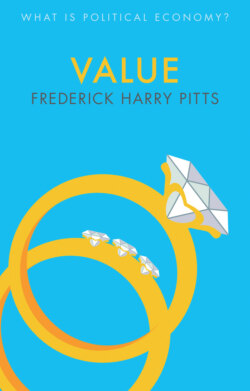Value

Реклама. ООО «ЛитРес», ИНН: 7719571260.
Оглавление
Frederick Harry Pitts. Value
Table of Contents
Guide
Pages
Series Title. What is Political Economy? series
Value
Copyright Page
Dedication
Introduction
Notes
1Value as Substance
Mercantilism and Physiocracy
Smith and Ricardo
Marx
Notes
2Value as Relation
The Denial of Value
Marx
Marx and Marginalism
Notes
3Value as Utility
Foundations
The Util
Measure
Notes
4Value and Institutions
A Social Theory of Value
Sociology of Valuation and Evaluation
The Politics of Value
Notes
5Value as Struggle
Social Constitution
Value at Work
Class Subjectivity
Notes
6Value in Crisis
A Crisis of Value?
Finance and Value
The Future of Value
Notes
Index
POLITY END USER LICENSE AGREEMENT
Отрывок из книги
Frederick Harry Pitts
A closed case for much of mainstream economic thinking, the issue of value is a pressing one because it exposes the tension at the heart of the social and political processes that render all things equivalent and comparable under the single measure of price. These processes are increasingly at stake politically. National populists content to sacrifice economic rationality for an emotional politics of belonging; anti-‘globalist’ protectionisms fencing value back within borders; anti-austerity social movements protesting the hunger for gold of high finance; the establishment of so-called ‘real’ economies centred on alternative currencies and business models that purport to keep wealth within localities – all lay claim to a critique of the social and political processes through which capital, states and other actors value and price the world around us. But only further populist discontent and frustration will follow the failure of this constellation of political tendencies to grasp what really underpins a society that knows the price of everything and the value of nothing.
.....
In his masterwork, Capital, Marx ‘start[s] from the simplest form of the product of labour’ in the society under study, which is that of capitalism.42 In capitalist society, this product is the commodity. Whilst some, as we will go on to see, have read this as an indication of the primacy of monetary exchange to Marx’s understanding of value, a substantialist reading of Marx’s value theory would instead suggest that Marx selects the commodity for the same reason as it was the starting point of Smith’s analysis: because it is a product of labour, which is the true underpinning principle of value.43 Marx suggests that the commodity is ‘the simplest social form in which the labour product is represented in contemporary society’.44 The commodity matters because labour matters. On this account, instead of looking at prices and seeking an explanation of why they are as they are, the aim for Marx was instead to understand the forms that labour takes and what the consequences of these forms might be.45 Marx stated the importance of a perspective rooted in labour in his engagement with Smith, suggesting that ‘As individuals express their life, so they are. What they are, therefore, coincides with their production, both with what they produce and how they produce.’46
Commodities, for Marx, possess a use value and an exchange value. On the market, commodities are equalized where their exchange values are concerned, and differentiated with regard to their use values. The former is what allows the commodity to be exchanged with others; the latter is what makes the commodity attractive as an object of utility or desire.47 Commodities must be sufficiently different from one another in order to have specific, particular characteristics that render a good or service a worthwhile purchase amongst all the other similar goods and services for sale on the market. For traditional readings of Marx’s value theory, this specificity consists in the ability of the labour engaged in production to offer a particular skill or capacity that endows the product of that labour with an individual use value carrying with it a practical, aesthetic or sensual application that makes the product of labour desirable as a commodity in itself. The commodity’s use value – its usefulness to the purchaser – therefore pertains to its endowment with a specific characteristic or feature rendering it superior or unique in some way with reference to other products. Exchange value, meanwhile – its power to command money in the market – is the criterion of the exchangeability of one commodity with one another, and dictates the proportion in which this can be done. In order to be considered exchangeable, two or more commodities must possess some common characteristic which brings them into relation with one another. The most immediate way in which two equivalent commodities might be said to be exchangeable is that they are products of human labour. From this flows the notion, common to the substantialist Marx and classical political economy, that value must have something to do with the labour expended in a product’s creation.48
.....